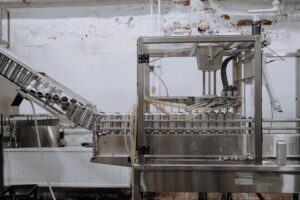Climatizer Insulation is Now Offering Curbside Pickup. Learn More Here
Why Do We Use Lean Manufacturing?
At Climatizer, we believe that our legacy is the impact we make on our community. And that includes the environment. Our responsibility to the future is included in our commitment to sustainability. That’s why we employ the business philosophy known as lean manufacturing.
As an insulation manufacturer, Climatizer has the responsibility to produce a more sustainable material. That’s one of the many reasons we specialize in cellulose, a natural fibre insulator that is made primarily from recycled paper and denim. If you’re looking for more information on cellulose and why we use it, check out our article here. But beyond our product, we believe our business practices must be sustainable. That’s where lean manufacturing comes in.
We emphasize a manufacturing process that is less wasteful through a business philosophy that prioritizes long-term benefits over short-term gains. Now let’s explore what that means.
What Is Lean Manufacturing?
Dated to the beginning of the 20th century, just as large-scale manufacturing became a reality, lean manufacturing is a production philosophy grounded in ethics. Companies at the time realized that industrialized businesses had widespread ecological and social effects. Furthermore, competition drove the need for efficiency and consistency. Therefore, the study of how things were made and the ethics of that production came into being.
While this philosophy has nuance and depth, in simple terms, lean manufacturing is a production process that maximizes productivity while also minimizing waste. Anything that does not add value to the customers is waste. You can imagine that when practicing lean manufacturing, a business like our own has a single goal with two purposes: to deliver value to the customer while minimizing waste.
That might seem overly simplistic. In reality, however, its application is revolutionary. Let’s explore how applying lean manufacturing to our business model promotes sustainability.
Lean Manufacturing Principles
There are five core principles of lean manufacturing as defined by its originators, Jim Womack and Dan Jones. Through these five principles, you see a process designed to identify the correct course of action for a business to take when prioritizing value and sustainability.
Here’s a very brief look at these factors.
Value
How much is a customer willing to pay for a product or service? That determines the value. The most efficient delivery of this value a producer can engage in is wasteless production.
Map the Value Stream
What materials and resources do you require to produce value? How can you maximize this value by improving efficiency? By mapping these questions out from start to finish, from materials sourced to product delivery, you can make the best decisions.
Create Flow
Creating flow is the process of removing functional barriers and improving lead time. This translates to a smooth process flow that experiences minimal delay or waste. When the assembly line works in perfect unison, you’ll get the highest value with the lowest waste.
Establish a Pull System
A pull system works by only starting when there is demand. This is the opposite of regular push systems, which produce a predetermined volume. This means that the production’s efficiency is determined by the accuracy of the predicted volume. Conversely, a pull system only produces as much as there is demand for. Although it’s more complicated, a pull system is more flexible and sustainable.
Perfection
The pursuit of perfection is an integral part of lean manufacturing. To maintain the best output, you must assess and test the system of production in search of a better way. As the system improves, value is added while waste is reduced.
Examples of Waste
According to one influential practitioner, Kiichiro Toyoda (the founder of Toyota) explained seven wastes that don’t provide value to the customer. They are:
- Unnecessary transportation
- Unnecessary movement of company resources
- Excess inventory
- Inefficient resource use
- Over-production
- Over-processing
- Costly defects
These are the original wastes that are avoided in this philosophy. At Climatizer, we apply these specific ideas to our manufacturing process, from start to finish. And an eight was added by many lean practitioners. Our staff adds value to our business through their skill and character. Best hiring practices and allowing our members to use their talent to their fullest potential is another important method to avoid waste.
Examples of Lean Manufacturing Tools
There are many branches of the lean manufacturing philosophy. Accordingly, the specific practices of maximizing customer value while reducing production waste can be applied in a large variety of ways across many diverse industries. That being said, they are all connected by core values. As such, there are a couple of commonly used lean manufacturing tools. These are:
- Bottleneck Analysis: a structured way of looking at workflows
- Value Stream Mapping: Analyzing and optimizing a process
- Root Cause Analysis: Method to get to the foundation of an issue
There are many more tools that are a part of this philosophy. For example, Climatizer emphasizes efficiency and sustainability in our supply chain. This matters a lot in a country as large and diverse as Canada, especially when we’re maintaining high standards for our natural fibre insulation, cellulose.
Why We Use Lean Manufacture Tools
Can’t we have our cake and eat it too? With lean manufacturing, Climatizer is able to make more money with less waste and harm done to the environment. Following this, the customer gets a better product and a cleaner environment.
As producers of sustainable insulation material, we have the responsibility to divert waste from landfills, reduce carbon emissions, and contribute to our local economy in a meaningful way.
You can read more about our commitment to sustainability here.
Sustainability Matters at Climatizer Insulation
Lean manufacturing is an idea that’s been around for a while but has seen growing popularity in recent years. In 2022, we are seeing the effects of negative business practices discussed a century ago. Naturally, we know that the problem solves itself only when everyone does their part. That’s why we employ lean manufacturing. By reducing waste and focusing on value, we create better products for our customers and sustain a better environment.
If lean manufacturing interests you, please use this article as a stepping-stone to more information. Specific details were left out in order to simplify a complicated subject. If you’d like to learn more about how and why Climatizer Insulation uses this sustainable business practice, check us out here. Or, if you’re ready to work with a business that prioritizes high-quality sustainable products, place your order here.





